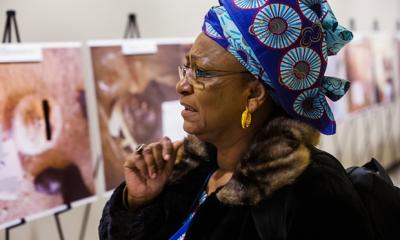Italian parliament queasy beside images of Syrian torture

ROME -- The President of Italy's Chamber of Deputies has refused to exhibit a collection of photographs of torture carried out by the Syrian regime in the country's prisons, taken by the former Syrian military police photographer known as Caesar, on the grounds that they are "too crude."
The photographs, of which there are 53,000 in total, were taken over the course of two years and document the torture and death of 6,786 people who died in detention in two of Syria's military prisons in Damascus under the rule of president Bashar al-Assad.
They have been exhibited in some of the world's most important institutions, including the UN Security Council in New York, the European Parliament and the UK Parliament, and following their release a report was commissioned which concluded that the photos provided "clear evidence, capable of being believed by a tribunal of fact in a court of law, of systematic torture and killing of detained persons by the agents of the Syrian government. It would support findings of crimes against humanity and could also support findings of war crimes against the current Syrian regime."
However, Laura Boldrini, president of the Italian Chamber of Deputies and former spokesperson for the UN High Commissioner for Refugees, has backtracked on her original agreement to show them, saying that they would be too upsetting for groups of students coming to visit the seat of the Chamber.
The photos were smuggled out of Syria on USB sticks by 'Caesar' - a code-name used to avoid identification -, who was one of the photographers employed by the Syrian regime to document the corpses of those who died in the prisons, often tortured, starved or burnt to death. The photos were intended to permit a death certificate to be produced without requiring families to see the bodies of those killed, thereby "avoiding the authorities having to give a truthful account of their deaths," the report said, as well as "to confirm that orders to execute individuals had been carried out."
Assad has denied the images' authenticity, but representatives of the U.S. State Department, British Foreign Secretary, Amnesty International and other bodies have said the photographs are irrefutable testimony of widespread human rights abuses that could rise to the level of war crimes.
Emma Bonino, from the delegation of the European Council, openly criticised Boldrini's refusal to show the photos, saying that "we have tried for months to bring to Rome these visual and unequivocal testimonies of the torture systematically perpetrated by the Assad regime against detainees, but the Chamber and the Senate have blocked it."
She cites political motives as part of the reason for the refusal, but urges that "if we do not show them we commit the error of tainting the facts, of bringing up generations of young people who do not know reality and its hardness. It seems to me an incomprehensible position."
Caesar, with the help of a friend, smuggled the photos out of the country with the hope they would open the international community's eyes to the reality of the Syrian conflict as well as to be used as evidence for the crimes being committed by the Syrian government. However, no trial has yet been opened, with the UN and many Western leaders abandoning promises to hold president Assad to account in the hope of greater collaboration in the fight against IS in Syria.
Assad's regime continues to be the primary threat to civilians in the country, with three quarters of civilian deaths in 2015 caused by government forces. Russian air strikes and Iranian ground troops remain key to Assad's power in the conflict, despite a tentative cease-fire agreement being signed on Thursday ordering the end of hostilities between regime and opposition forces. If the deal goes ahead it will come into effect in six days, but Russia has shown no sign of decreasing its targeted bombing of civilians and Syrian opposition groups, destroying two hospitals and killing at least 20 in a strike on Monday.
The Italian government's obsequious attempts to avoid offence and political awkwardness, demonstrated already in the covering of ancient Roman statues for the visit of Iranian president Rohani, has been laid bare once again.
ft



